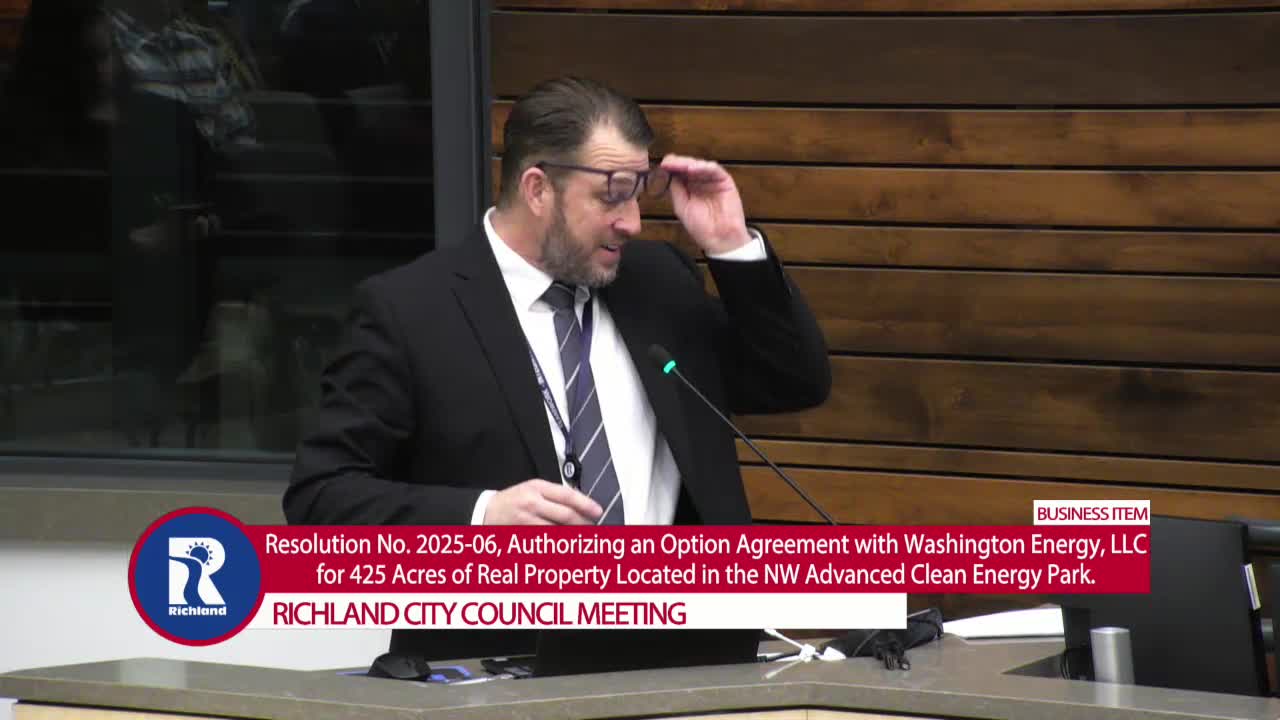Richland council authorizes option agreement with Washington Energy for nuclear supply‑chain campus
Get AI-powered insights, summaries, and transcripts
Subscribe
Summary
Richland — The Richland City Council on Jan. 7 voted unanimously to authorize an option agreement that reserves up to 425 acres in the Northwest Advanced Clean Energy Park for Washington Energy LLC to explore development of a nuclear supply‑chain campus.
Richland — The Richland City Council on Jan. 7 voted unanimously to authorize an option agreement that reserves up to 425 acres in the Northwest Advanced Clean Energy Park for Washington Energy LLC to explore development of a nuclear supply‑chain campus.
The option agreement, described to council by Deputy City Manager Joe Schissel, “is a contract granting a buyer the exclusive right, but not the obligation to purchase property at a specified price within a set time period.” Schissel said the option would provide Washington Energy time for feasibility work while both parties negotiate a future purchase and sale agreement.
The agreement covers up to 425 acres of the city’s clean energy park, includes five annual extension rights with associated fees, and calls for staged property closings carried out under later purchase and sale agreements signed by the city manager. Schissel told council the buyer would be responsible for roads and utilities needed for the project and that the option has a series of payments that “total a million dollars over that 5 year time.” He said the purchase math would equate to an average of about $63,000 per acre if all 425 acres were purchased.
Why it matters: City staff described the project as potentially large in scale and long‑term. Schissel said material terms presented by Washington Energy included an approximate $3 billion capital investment, about 1,000,000 square feet of building space devoted to nuclear fuel‑cycle processing, an estimated 1,000 direct jobs and roughly 3,000 induced jobs. Council members and a broad set of local institutions and unions told the council they view the project as an economic development opportunity that could expand the region’s clean‑energy and nuclear supply chains.
Public comment and regional support: Dozens of residents and organizational representatives addressed council during an extended public comment period, almost all urging council approval. Carl Dye, president and CEO of the Tri‑City Development Council (TRIDEC), urged a unanimous vote and said the project is “the type of project that we intended that transfer and that relationship to benefit from.” Julian Jensen, a representative for Western States Carpenters Local 59, told council: “we do support this project, this resolution.” Labor representatives from multiple trades also spoke in favor, saying the project would support apprenticeships and local hiring.
Local academic and research leaders framed the proposal as complementary to ongoing regional initiatives. Noel Schultz, director of the Institute for Northwest Energy Futures at Washington State University Tri‑Cities, said, “This project, Project Dune, reinforces the Tri Cities' reputation as a global leader in the nuclear industry,” and said regional partners are pursuing related research and workforce proposals. WSU Tri‑Cities Chancellor Sandra Haines, who also serves as TRIDEC board chair, spoke about the campus’s potential to retain graduates and support STEM programs.
Regulatory and fiscal conditions: Schissel emphasized the option is not a sale; it is an opportunity to negotiate. He noted a number of conditions and approvals would be required before substantial development, including an NRC (Nuclear Regulatory Commission) license for any nuclear fuel‑cycle work. Schissel said NRC licensing imposes financial assurance requirements — bonds, insurance or cash set aside — to cover decommissioning or remediation if needed.
Schissel also said the project would rely on a targeted urban area (TUA) agreement to provide a 10‑year property‑tax abatement on the value of improvements, a local incentive the city has used previously. He said phases 1 and 2 of the project are intended for Washington Energy’s own fuel‑cycle operations; phase 3 would be marketed to other potential users of a nuclear supply park. He told council the option agreement provides 30 days for the parties to negotiate the form of the purchase and sale agreement; Exhibit A of the current option is blank because the sale documents remain to be negotiated.
Council discussion and vote: Council members thanked staff and the many speakers who attended. Councilmember Luxon moved to approve the resolution; the motion was seconded and passed on a roll‑call vote with Mayor Richardson, Mayor Pro Tem Kent, Councilmembers Jones, Luxon, Meyer, Witten and Van Dyke all recording aye votes (7‑0).
What’s next: Staff will proceed to negotiate the purchase and sale agreement during the option/due‑diligence period and Washington Energy will continue feasibility and licensing steps. As Schissel noted, the option does not obligate a sale; the deal would move forward only if both parties reach a mutually acceptable purchase and sale agreement and regulatory prerequisites are met.
